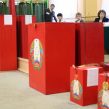
Elections and Politics in and Around Belarus
Publication: Eurasia Daily Monitor Volume: 12 Issue: 114
By:

The chairwoman of the Central Electoral Commission of Belarus, Lidia Ermoshina, has proposed to conduct the upcoming presidential elections on October 11—that is, more than one month earlier than the previously set date of November 15. The official explanation of this shift has to do with the constitutional necessity for the parliament to announce the election date three months in advance. For the legislature to announce three months in advance that elections will take place on November 15, members of parliament would have to be recalled from their summer recess. If, however, the date of the election is moved up, the parliament can launch the electoral campaign during its last session before the break, on June 30 (Tut.by, June 9).
Opposition-minded observers, however, believe that the change was precipitated by the progressively worsening economy—not only is Belarus experiencing no growth, but major enterprises will, most likely, have to resort to layoffs. Also, the closer the date of the election, the more difficult it will be for presidential hopefuls to collect the requisite 100,000 signatures to be registered because in summer many people are on vacation (Naviny.by, June 9).
Aside from the incumbent, President Alyaksandr Lukashenka, seven persons have declared their ambitions to run. These are Tatyana Korotkevich from the Speak the Truth public campaign, until recently headed by Vladimir Neklyaev; Anatoly Lebedko, a veteran of the opposition who leads the United Civic Party; Sergei Kalyakin, the leader of the left-wing party The Just World; Sergei Gaidukevich, the chairman of the Liberal Democratic Party who earned the image of a sparring partner of President Lukashenka; Elena Anisim, the deputy chairperson of the Belarusian Language Society; Anatoly Levkovich, a retiree who used to be active as a social democrat; and Yury Shulgin, who is unemployed and has received support from the Green party (Naviny.by, June 11). To be sure, Belarus continues to be largely a non-party state (according to definitions by such Belarus watchers as Stephen White from the University of Glasgow and Petr Hlavacek from Charles University in Prague). In other words, both the membership of the parties and their representation in the parliament continue to be minuscule. The electoral rating of all the above-mentioned candidates is minuscule as well. As for Lukashenka, the March national survey by the Independent Institute for Socio-Economic and Political Studies revealed that 34 percent of the respondents were ready to cast a vote for him if the elections had been held “today.” In December 2014, Lukashenka’s rating was 40 percent (Tut.by, June 10).
Against the backdrop of the worsening economic situation and the armed conflict in neighboring Ukraine, the attempts to boost Belarusians’ allegiance to their country continue on both sides of the domestic political divide. On the side of the Belarusian Westernizers, Siargei Dubavets has published a manifesto: “Why Belarus Is No Russia: Seven Principal Differences” (Svaboda.org, June 9). According to Dubavets, Belarus’s distinctions vis-à-vis Russia are a compact national territory, which one can easily crisscross and gain first-hand emotional connection to its every corner; the historical experience of living under the Renaissance and democracy (within the Grand Duchy of Lithuania); past migration experience, whereby Belarus used to be an origin of hundreds of thousands migrants to Muscovy and would receive bureaucrats, military officials, estate owners, and priests in return; the widespread influence of the Jews on Belarusian mentality and traditions; religious tolerance and a lack of a single religious tradition; ethno-territorial homogeneity; and the experience of anti-empire activities (notably, uprisings of the 19th century that Belarusian Westernizers claim were Belarusian-and-Polish). In turn, Yegor Churilov, from the government-friendly think tank Citadel, came up with a lengthier but somewhat less articulate “Spirit of the Nation” manifesto. According to Churilov, Belarusians and their businesses ought to boost their sense of national and social responsibility; Belarus’s economy should retain and modernize its highly specialized niche in the global and regional division of labor; Belarusians need to “retain and develop the Belarusian language, this “cultural jewel of Belarus”; and Belarus should not detach itself either from the West or from the East (Citadel, June 10). At least the two last points now appear to be shared across the political divide.
Indeed, 83 percent of Russians, probed by Levada Polling Agency, designated Belarus as Russia’s best friend, while 80 percent named China (Tut.by, June 11). The Russian ambassador to Minsk, Alexander Surikov, suggested that Belarusians should not be leery of Russia’s “imperial ambitions” (Tut.by, June 10). He also pledged that Russia will allow Belarus to postpone the repayment of $1.3 billion out of the $4 billion that Belarus was required to repay Russia in 2015 for its loans to Belarus (Tut.by, June 10). At the same time, an opposition-minded Russian pundit, Dmitry Oreshkin, expressed the view that Belarus’s drift to the West is unavoidable as Vladimir Putin presides over a destructive trend in the Russian economy. However, Putin does not have the resources to unseat Lukashenka, Oreshkin asserts (Svaboda.org, June 9).
The events on Belarus’s western geopolitical flank have been arguably more controversial. On the one hand, at the end of June, Minsk will, for the first time, host a meeting of foreign ministers of the Eastern Partnership countries to discuss the outcomes of May’s Riga summit (Tut.by, May 24). On the other hand, President Barack Obama rubber-stamping the extension of the United States’ sanctions against Belarus came across to many in Minsk as an aberration against the backdrop of an obvious improvement in mutual relationships. The press secretary of the Belarusian foreign ministry explained the event by the “sluggishness of American bureaucracy.” He pointed out that the text of the respective executive order matches that of 2014 verbatim. “Therefore, there is no need to criticize this decision of the American President… That a certain improvement of Belarusian-American relations has occurred lately” is obvious for everybody, after all, the press secretary argued (Tut.by, June 11).




